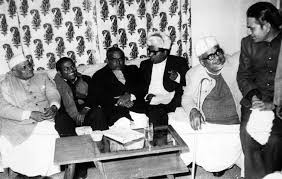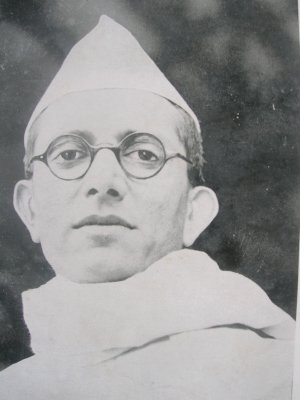|
Ministry Of Commerce And Industry (India)
The Ministry of Commerce and Industry administers two departments, the Department of Commerce and the Department for Promotion of Industry & Internal Trade. The head of the Ministry is a Minister of Cabinet rank. Minister of Commerce and Industry The Minister of Commerce and Industry is the head of the Ministry of Commerce and Industry and one of the cabinet ministers of the Government of India. The first Minister of Commerce and Industry of independent India was Syama Prasad Mukherjee. The current Minister is Piyush Goyal of the Bharatiya Janata Party. Goyal took over from Suresh Prabhu on 31 May 2019. Past Ministers: Industry Past Ministers: Commerce Present : Commerce & Industry List of Ministers of State Department of Commerce The department is entrusted with formulating and implementing the foreign trade policy and responsibilities relating to multilateral and bilateral commercial relations, state trading, export promotion measures, and development an ... [...More Info...] [...Related Items...] OR: [Wikipedia] [Google] [Baidu] |
Emblem Of India
The State Emblem of India is the national emblem of the Republic of India and is used by the union government, many state governments, and other government agencies. The emblem is an adaptation of the Lion Capital of Ashoka, an ancient sculpture dating back to 280 BCE during the Maurya Empire. The statue is a three dimensional emblem showing four lions. It became the emblem of the Dominion of India in December 1947, and later the emblem of the Republic of India. History Following the end of British occupation on 15 August 1947, the newly independent Dominion of India adopted an official state emblem on 30 December 1947. The emblem consisted of a representation of the Lion Capital of Ashoka at Sarnath enclosed within a rectangular frame.Co ... [...More Info...] [...Related Items...] OR: [Wikipedia] [Google] [Baidu] |
Ram Subhag Singh
Ram Subhag Singh (7 July 1917 – 16 December 1980)''Data India'', Press Institute of India, 1981 was an Indian politician who was a member of the Indian National Congress. He served as a member of the 3rd and 4th Lok Sabha for Bikramganj and Buxar in the Bihar state of India in 1962 and 1967, respectively. After the split in the Congress party in 1969, he stayed with the Indian National Congress (Organisation). He was first leader of the opposition in the Lok Sabha in 1969. He participated in the Indian independence movement. He was a cabinet minister in the Union Government led by the Congress party. Early life Singh was born in July 1917 in Ara district of the Bihar State in India. He undertook his primary education at the Government Town School, Ara Bihar, and his secondary education at Kashi Vidyapeeth, Varanasi, Uttar Pradesh. Singh went to the University of Missouri The University of Missouri (Mizzou, MU, or Missouri) is a public land-grant research universit ... [...More Info...] [...Related Items...] OR: [Wikipedia] [Google] [Baidu] |
Nityanand Kanungo
Nityanand Kanungo was one of India's prominent politicians from the state of Odisha, who held successive high-profile portfolios in Prime Minister Jawaharlal Nehru's cabinet. Nityanand Kanungo was born in Cuttack on 4 May 1900 and was educated at Ravenshaw College and University College (Calcutta). He was a member of the Indian National Congress and served as a member of the Orissa Legislative Assembly from 1937 to 1939 and again from 1946 to 1952. When Orissa was granted provincial autonomy as per the Government of India Act 1935, Kanungo served as the Minister for Revenue and Public Works Departments in the cabinet of Bishwanath Das from 1937 to 1939. He was again appointed a Minister in 1946 and served till 1952, looking after the Home, Law, Industries and Agriculture portfolios. In 1952, Kanungo was elected to the Lok Sabha from the Kendrapara constituency. In September, 1954 he was appointed Union Deputy Minister of Commerce and Industry. From August 1955 in Prime Minis ... [...More Info...] [...Related Items...] OR: [Wikipedia] [Google] [Baidu] |
Lal Bahadur Shastri
Lal Bahadur Shastri (; 2 October 1904 – 11 January 1966) was an Indian politician and statesman who served as the 2nd Prime Minister of India from 1964 to 1966 and 6th Home Minister of India from 1961 to 1963. He promoted the White Revolution – a national campaign to increase the production and supply of milk – by supporting the Amul milk co-operative of Anand, Gujarat and creating the National Dairy Development Board. Underlining the need to boost India's food production, Shastri also promoted the Green Revolution in India in 1965. This led to an increase in food grain production, especially in the states of Punjab, Haryana and Uttar Pradesh. Shastri was born to Sharada Prasad Srivastava and Ramdulari Devi in Mughalsarai on 2 October 1904. He studied in East Central Railway Inter college and Harish Chandra High School, which he left to join the non-cooperation movement. He worked for the betterment of the Harijans at Muzaffarpur and dropped his caste-deriv ... [...More Info...] [...Related Items...] OR: [Wikipedia] [Google] [Baidu] |
Shashtri2
''Shastri'' (also known as ''Darshan Shastri'') is a 2005 Kannada-language action gangster film written and directed by P. N. Sathya and produced by Anaji Nagaraj in the banner of Namana films. The film stars Darshan and Manya in lead roles. The film has a musical score by Sadhu Kokila. The film portrays the downfall of an impulsive youngster after facing betrayal in love and his further journey through crime after making his family believe that he is dead. The core storyline of the movie was heavily inspired by the 1995 classic '' Om''. ''Shastri'' was premiered on Udaya TV Channel. The film was dubbed in Hindi as ''Main Hoon Yoddha'' . Plot ''Shastri'' tells the story of a medical student Shastri who becomes a victim of circumstances and is led to a life in the underworld. But he is a Good Samaritan Don who helps out the poor and depressed. In the bargain, he antagonizes many cruel dons who wants to settle scores with him. Added to this issue, there is a love angle added wi ... [...More Info...] [...Related Items...] OR: [Wikipedia] [Google] [Baidu] |
Morarji Desai
Morarji Ranchhodji Desai (29 February 1896 – 10 April 1995) was an Indian independence activist and politician who served as the 4th Prime Minister of India between 1977 to 1979 leading the government formed by the Janata Party. During his long career in politics, he held many important posts in government such as Chief Minister of Bombay State, Home Minister, Finance Minister and 2nd Deputy Prime Minister of India. Following the death of Prime Minister Lal Bahadur Shastri, Desai was a strong contender for the position of Prime Minister, only to be defeated by Indira Gandhi in 1966. He was appointed as Deputy Prime Minister (as Minister of Finance) in Indira Gandhi's cabinet, until 1969. When Indian National Congress split in 1969 he became a part of the INC (O). After the controversial emergency was lifted in 1977, the political parties of the opposition fought together against the Congress (I), under the umbrella of the Janata Party, and won the 1977 election. Desa ... [...More Info...] [...Related Items...] OR: [Wikipedia] [Google] [Baidu] |
Harekrushna Mahtab
Harekrushna Mahatab (21 November 1899 – 2 January 1987) was the leader of the Indian National Congress, a notable figure in the Indian independence movement and the Chief Minister of Odisha from 1946 to 1950 and again from 1956 to 1961. He was popularly known by the sobriquet "Utkal Keshari". Early life Harekrushna Mahtab was born at Agarpada village in Bhadrak district of Odisha. He was born to Krushna Charan Das and Tohapha Debi in an aristocratic Khandayat family. After passing his matriculation examination from Bhadrak High School, he joined Ravenshaw College, Cuttack but left his studies in 1921 to join the independence movement. Political career In 1922, Mahatab was imprisoned and charged with sedition. He was the Chairman of Balasore District Board from 1924 to 1928. He became the member of Bihar and Odisha Council in 1924. He joined the Salt Satyagraha movement and was imprisoned again in 1930. He was elected as the General Officer Commanding of Congress Sevadal for t ... [...More Info...] [...Related Items...] OR: [Wikipedia] [Google] [Baidu] |
Indian National Congress
The Indian National Congress (INC), colloquially the Congress Party but often simply the Congress, is a political party in India with widespread roots. Founded in 1885, it was the first modern nationalist movement to emerge in the British Empire in Asia and Africa. From the late 19th century, and especially after 1920, under the leadership of Mahatma Gandhi, the Congress became the principal leader of the Indian independence movement. The Congress led India to independence from the United Kingdom, and significantly influenced other anti-colonial nationalist movements in the British Empire. Congress is one of the two major political parties in India, along with its main rival the Bharatiya Janata Party. It is a " big tent" party whose platform is generally considered to lie in the centre to of Indian politics. After Indian independence in 1947, Congress emerged as a catch-all and secular party, dominating Indian politics for the next 20 years. The party's first pr ... [...More Info...] [...Related Items...] OR: [Wikipedia] [Google] [Baidu] |




